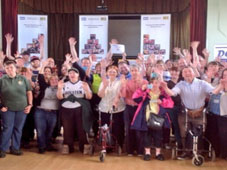The Great Leap

Hertfordshire Community Learning Disability Service (CLDS) and local citizens have developed, co-produced and "activated" a project across Herts known as the Great Leap Project. This project was set up to change the culture in social work practice and develop a truly community focused project. Mark Harvey, Social work and communities lead for Hertfordshire Local Authority, explains how they did it with support from Making it Real.
We wanted to challenge the ideas of risk aversion in our practice and promote real inclusion by investing in and enabling people to experience and engage with the wonders of real community. More importantly, allowing communities to benefit from the skills, gifts and abilities that people with learning disabilities should be able to give back to society. Our joint goal was to help people with learning disabilities become part of the nuts and bolts of what makes up a diverse and wonderful community. One of the key supports to this work was to incorporate the ideas of the Making it Real project and making sure that we tried to model practice against both the 'I' statements and the various models of community capacity building.
Getting started
Firstly our Community Learning Disability Service and local citizens explored models of personalisation and strengths based approaches. They reviewed international approaches and modified them for use in Hertfordshire. The group developed an 'engagement project' that used Asset Based Community Development (ABCD) and 'local area co-ordination' to complement this approach.
Part two
This group of social workers and citizens then ran workshops to teach these skills and models to social workers and service providers with the focus of making sure that all support plans have clear and personalised outcomes that allow people to use their strengths rather than have a passive approach to care planning. These sessions got service providers to think about themselves and their personal use of community and strengths and reflect on why they may not facilitate such approaches in their work. They were then tasked to go and run these sessions with citizens and design local citizen focused plans that allow for good lives.
Community learning disability teams and people who have a learning disability ran community events using the principles of ABCD and local area co-ordination. Each event invited local community groups and businesses to run stalls and showcase what they do, seek volunteers and employees. Those providers who ran care services were encouraged to attend to learn about real community themselves.
Over the initial eight events we were able to attract 78 community groups, societies and individuals to share the things that make communities strong and innovative. People who use social care services were able to see that there are more opportunities locally than disability focused care.
Support staff also learnt there was more to community than what they offered or were commissioned to deliver as a care provider. It opened their eyes to the options of personalisation.
The community leads also took the opportunity to map people's skills and strengths as a way to link them up with community projects they might like to join. This is the start of our journey but it is a journey that has challenged and developed our thinking with people to try to design something that leads to real outcomes in real communities.

Comments
Add your comment